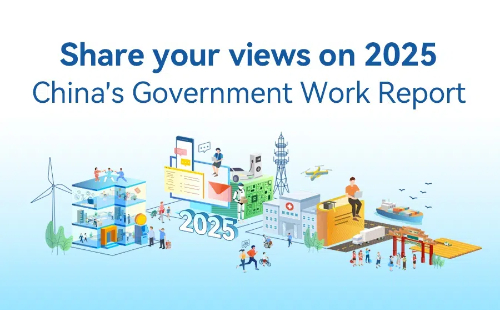Zhejiang meets socioeconomic development goals
Despite facing a complex and challenging external environment, Zhejiang achieved its main socioeconomic development targets in 2024, with the province's GDP growing by approximately 5.5 percent.
The accomplishment is evidence of the resilience of Zhejiang's economic development, according to officials and experts.
The third session of the 14th Zhejiang Provincial People's Congress opened on Tuesday. Acting Governor Liu Jie presented the government work report on behalf of the provincial government, stating that this year, Zhejiang will steadfastly shoulder the responsibility of being a major economic powerhouse and strive to contribute more to national economic growth.
According to the report, Zhejiang's GDP growth was approximately 5.5 percent last year. Among the province's economic achievements, the digital economy stood out, with the added value of core industries in the sector increasing by around 8 percent.
Meanwhile, the province actively promoted high-level openness, accelerating the development of world-class ports and transportation infrastructure. The cargo and container throughput at Ningbo-Zhoushan Port increased 4 percent and 11.3 percent, respectively, with its International Shipping Center Development Index ranking rising to eighth globally.
The construction of the China-Europe freight train assembly center also advanced, with 2,619 trains operating under the Yiwu-Xinjiang-Europe freight service, an increase of 10 percent. In foreign trade, goods exports reached 3.9 trillion yuan ($532 billion), growing by 9.5 percent, with the province's share in the national total increasing to 15.3 percent.
Luo Weidong, a professor at the School of Economics at Zhejiang University and a member of the 14th National Committee of the Chinese People's Political Consultative Conference, the country's top political advisory body, said: "Zhejiang's economic growth has consistently been a national leader since the reform and opening-up. With over 60 percent of its economy relying on international markets, disruptions in global demand due to uncontrollable factors can impact the economy. Despite historical shocks, such as the Southeast Asian financial crisis and the COVID-19 pandemic, Zhejiang has demonstrated strong recovery capabilities, underscoring its economic resilience.
"Achieving a GDP growth of 5.5 percent in 2024 was challenging and was also related to the vitality and dynamism of Zhejiang's private economy, which remains robust and extensive," Luo added.
The report highlighted that Zhejiang's primary goal for this year is to achieve approximately 5.5 percent GDP growth. Liu emphasized that leading innovation to foster the development of new productive forces and building a modern industrial system are key focuses for the Zhejiang provincial government in 2025.
Luo believed that Zhejiang would prioritize the development of artificial intelligence in algorithms and computational power, aiming to rank among the top provinces in fostering new productive forces.
"Zhejiang has laid the foundation for this over many years with the development of technology-driven companies like Alibaba. It now faces the task of digital transformation, including revitalizing traditional industrial chains through digitalization and achieving deep integration of digitalization and industrialization to remain a national leader."
"I remain optimistic about Zhejiang's future economic growth," Luo said. "Especially in areas related to new productive forces. Coupled with policy support from the provincial government and local legislation, Zhejiang is making steady progress. Moreover, the pragmatic and fast-paced work ethic of Zhejiang people will significantly contribute to the province's economic development."
To develop new productive forces and build a higher-level open economic system, Nan Cunhui, chairman of Zhejiang-based CHINT Group Co and a member of the Standing Committee of the National Committee of the CPPCC, suggested leveraging the innovative driving force of private enterprises.
CHINT Group, a global leader in smart energy solutions, also advocated for the government and enterprises to work together to establish a mechanism linking international commercial mediation, litigation and arbitration. Additionally, Nan suggested further increasing credit and financial support for private enterprises' overseas investment projects and enhancing the efficiency of overseas investment approvals.





 play
play